Progressive Conservative Party of Ontario
Progressive Conservative Party of Ontario | |
|---|---|
Active provincial party | |
 | |
| Leader | Doug Ford |
| President | Jag Badwal[1] |
| Founded | 1854 (1854) (Conservative Party of Canada West) |
| Preceded by | Upper Canada Tories |
| Headquarters | 400-59 Adelaide St. E Toronto, Ontario M5H 3H1 |
| Student wing | Ontario PC Campus Association |
| Youth wing | Ontario PC Youth Association |
| Membership (2018) | 133,000[2] |
| Ideology | Majority: • Conservatism[3] • Economic liberalism • Fiscal conservatism • Populism Factions: • Centrism • Liberal conservatism • Social conservatism • Libertarian conservatism |
| Political position | Center-right to Right-wing |
| Colours | Blue |
| Seats in Legislature | 76 / 124 |
| Website | |
www.ontariopc.ca | |
| |
The Progressive Conservative Party of Ontario (French: Parti progressiste-conservateur de l’Ontario),[4] often shortened to Ontario PC Party or PC, is a centre-right conservative political party in Ontario, Canada. The party has been led by Premier Doug Ford since March 10, 2018.
It has governed the province for 80 of the 151 years since Confederation, including an uninterrupted run from 1943 to 1985. It currently holds a majority government in the 42nd Parliament of Ontario.
Contents
1 Ideology and principles
1.1 Ideology
1.2 Principles
2 Origins
3 History
3.1 Confederation
3.2 Pre-war dynasty
3.3 Post-war dynasty
3.4 Big Blue Machine era
3.5 1980s to 1995: in Opposition
3.6 Mike Harris and the "Common Sense Revolution"
3.7 Ernie Eves: distancing the party from Harris and 2003 defeat
3.8 Opposition under John Tory (2004 to 2009)
3.8.1 2008 party convention and the leadership review question
3.9 Opposition under Tim Hudak (2009 to 2014)
3.10 Opposition under Patrick Brown (2015 to 2018)
3.11 Transition under Vic Fedeli (January to March 2018)
3.12 Doug Ford leadership (March 2018 to present)
4 Party leaders
5 Party presidents
6 Party Executive
7 Election results
8 References and footnotes
9 See also
10 External links
Ideology and principles
Ideology
| This article is part of a series on |
| Conservatism in Canada |
|---|
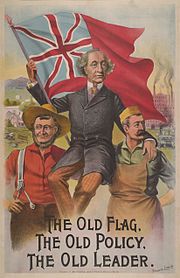 |
Schools
|
Principles
|
Parties
|
Historical
|
Organizations & Media
|
Related
|
The Ontario PC Party is a centre-right conservative political party.[5][6] Its beliefs and policies have been described as fiscally conservative, capitalist and populist.[7][8].
The Ontario PC Party favors economic policies that center around lower taxes, lower government spending, balanced budgets and deregulation.[9] Its economic policies are more capitalist than that of its main political opponents. The party supports reducing taxes for individuals and businesses.[10] It is completely opposed to carbon taxes and cap-and-trade systems.[11]
The Ontario PC Party's policies on social issues do not follow a particular ideology. Its policies on issues involving morality, family and sexuality tend to favor less government intervention and more individual freedom. It has been described as both socially conservative and socially liberal.[12][13] On drug policy, the PC Party supports the expansion of alcohol and cannabis sales to private retailers, but is skeptical of the benefits of supervised injection sites.[14][15] The party does not support the creation of provincial legislation regulating abortion. The PC Party supports sex education, but believes that parents should be allowed to withdraw their children from sex education classes. The Ontario PC Party supports immigration and Canada's policy of multiculturalism.
Since Doug Ford became leader of the Ontario PC Party, the party has been described as populist.[16] Doug Ford stated that his party speaks for the majority of Ontarians rather than for elites. Ford stated that elites are people who believe that they are superior to others. He described several politicians, political staffers, public sector executives and journalists as being elitist. Ontario PC Party policies referred to as populist include the Ford government's decision to remove the board of Hydro One and reduce the size of Toronto city council.[17]
Principles
The Ontario PC Party's constitution outlines the party's statement of principles. These principles include:[18]
- Freedom of worship, speech and assembly
- Loyalty to the Monarch of Canada
- The rule of law
- Allowing the peaceful enjoyment of the fruits of one's labor
- Accountability in government
- Canadian federalism
- Democracy
- Economic freedom
- Private ownership of property
- Entrepreneurship
- Equality of opportunity
- Supporting those in need
- Cultural diversity
- Environmentalism
Origins

John Sandfield Macdonald
The first Conservative Party in Upper Canada was made up of United Empire Loyalists and supporters of the wealthy Family Compact that ruled the colony. Once responsible government was granted in response to the 1837 Rebellions, the Tories emerged as moderate reformers who opposed the radical policies of the Reformers and then the Clear Grits.
The modern Conservative Party originated in the Liberal-Conservative coalition founded by Sir John A. Macdonald and George-Étienne Cartier in 1854. It is a variant of this coalition that formed the first government in Ontario with John Sandfield Macdonald as Premier.
Until becoming the Progressive Conservatives in 1942, the party was officially known as the Liberal-Conservative Association of Ontario, reflecting its Liberal-Conservative origins, but became widely known as the Conservative Party.
History
Confederation
John Sandfield Macdonald was actually a Liberal and sat concurrently as a Liberal Party of Canada MP in the House of Commons of Canada but he was an ally of John A. Macdonald (though not a relative). His government was initially a true coalition of Liberals and Conservatives under his leadership but soon the more radical Reformers bolted to the opposition and Sandfield Macdonald was left leading what was essentially a Conservative coalition that included some Liberals under the Liberal-Conservative banner. After losing power in 1871, this Conservative coalition began to dissolve. What was originally a party that included Catholics and Protestants became an almost exclusively English and Protestant party, more and more dependent on the Protestant Orange Order for support, and even for its leadership. The party became opposed to funding for separate (Catholic) schools, opposed to language rights for French-Canadians, and distrustful of immigrants. Paradoxically, an element of the party gained a reputation for being pro-labour as a result of links between the Orange Order and the labour movement.
Pre-war dynasty
After 33 years in Opposition, the Tories returned to power under James P. Whitney, who led a progressive administration in its development of the province. The Whitney government initiated massive public works projects such as the creation of Ontario Hydro. It also enacted reactionary legislation (such as Regulation 17) against the French-Canadian population in Ontario. The Tories were in power for all but five years from 1905 to 1934. After the death of Whitney in 1914, however, they lacked vision and became complacent. The Tories lost power to the United Farmers of Ontario in the 1919 election but were able to regain office in 1923 election due to the UFO's disintegration and divisions in the Ontario Liberal Party. They were defeated by Mitch Hepburn's Liberals in 1934 due to their inability to cope with the Great Depression.
Post-war dynasty
Late in the 1930s and early in the 1940s, the Conservatives re-organized and developed new policies. Rather than continue to oppose government spending and intervention, a policy which hurt the party politically in the time of the Great Depression, the Conservatives changed their policies to support government action where it would lead to economic growth.
The party changed its name to the "Progressive Conservative" party after its federal counterpart changed its name to the Progressive Conservative Party of Canada in December 1942 on the insistence of its new leader, John Bracken, whose roots were in the populist Progressive Party.
The Conservatives took advantage of Liberal infighting to win a minority government in the 1943 provincial election, reducing the Liberals to third-party status. Drew called another election in 1945, only two years into his mandate, to get a majority government. The Tories played up Cold War tensions to win a landslide majority, though it emerged several years later that the Tory government had set up a secret department of the Ontario Provincial Police to spy on the opposition and the media. The party would dominate Ontario politics for the next four decades.
Under Drew and his successor, Leslie Frost, the Party was a strong champion of rural issues but also invested heavily in the development of civil works throughout the province, including the construction of the 400 series of highways, beginning with the 401 across Toronto. In 1961, John Robarts became the 17th premier of Ontario. He was one of the most popular premiers in years. Under Robarts' lead, the party epitomized power. He was an advocate of individual freedoms and promoted the rights of the provinces against what he saw as the centralizing initiatives of the federal government, while also promoting national unity against Quebec separatism. He hosted the 1967 "Confederation of Tomorrow" conference in Toronto in an unsuccessful attempt to achieve an agreement for a new Constitution of Canada.
Robarts opposed Canadian medicare when it was proposed, but later endorsed it fully, and the party implemented the public health care system that continues to this day. He led the party towards a civil libertarian movement. As a strong believer in the promotion of both official languages, he opened the door to French education in Ontario schools.
Big Blue Machine era
In 1971, Bill Davis became party leader and the 18th premier. Anti-Catholicism became an issue again in the 1971 election, when the Tories campaigned strenuously against a Liberal proposal to extend funding for Catholic separate schools until Grade 13. Davis reversed himself in 1985, and enacted the funding extension as one of his last acts before leaving office.
Davis governed until 1985 with a team of advisers known as the "Big Blue Machine" because of their reputed political and strategic skills. Their stamp on the party was so strong that many refer to the Tories' long rule over Ontario as the "Big Blue Machine era".
During Davis's time as leader of the PC Party, the party moved to the centre, and on some issues, moved to the left of the Liberals. However, its base of support remained with socially conservative voters in rural central Ontario. This made him one of the most popular politicians in Ontario's history. Other conservatives in the federal PC Party accused him of damaging the conservative image in Canada by moving to the left on some issues. Davis continued the rapid expansion of community colleges, universities and highways, across Ontario.
1980s to 1995: in Opposition

Party logo in 1985

Party logo in 1987
Party logo in 1990
Davis retired in 1985. At a leadership convention, he was succeeded by Industry and Trade Minister Frank Miller. Miller was considerably more conservative than Davis, and began shifting the party back to the right. Soon after taking office, he called an election in which the Conservatives were reduced to a minority government, and actually finished behind the Liberals in the popular vote for the first time in 42 years.
Soon afterward, he the Ontario New Democratic Party of Bob Rae reached an agreement with David Peterson's Liberals in which the NDP would support a Liberal minority government. Miller was defeated in a no-confidence motion on June 18. Peterson was asked to form a government later in the day, ending the longest period of one-party rule in Canadian provincial history. Miller was replaced as leader by Larry Grossman at a second leadership convention.
When the Liberal-NDP Accord expired, an election was held in 1987 in which the Tories were reduced to third place in the Legislative Assembly of Ontario. They only won 16 seats, their worst showing in over half a century. Grossman was personally defeated in his downtown Toronto riding and resigned immediately. Andy Brandt was the party's interim leader until a leadership election was held in 1990 in which Mike Harris defeated Dianne Cunningham.
Three months after the election of Harris, and only three years into the, typically, four-year term of the Liberal government, David Peterson called a provincial election, in which the Tories failed to improve their standing, but which resulted in the defeat of the Liberals by Rae's NDP.
Mike Harris and the "Common Sense Revolution"

Logo of the Ontario PC Party from the mid-1990s to 2003

Ontario's 22nd Premier Mike Harris
In the 1995 election, Harris catapulted his party from third place to an election victory, running on a libertarian platform known as the "Common Sense Revolution" that highlighted a number of "wedge issues" and promised significant tax cuts, cuts to welfare, the introduction of workfare, and a 30% reduction in provincial income taxes. Harris went on to win a second majority in 1999 despite the strikes and protests that plagued his first term in office.
The Harris government was criticized on issues such as health care, the environment, education, and its social policies, but it won a second majority in the 1999 general election and it remained generally popular until Harris's departure as party leader in 2002.
The slide in Conservative support began in early 2000, according to the Ipsos-Reid polling company, when the Tories fell behind the Liberals in the public opinion polls for the first time since the 1999 election, with 36% support of those polled, compared to 42% for the Liberals and 17% for the NDP. Later in 2000, Liberal support rose to about half of those polled, while Conservative support remained in the low 30s. This pattern held through to the 2002 leadership campaign, when Conservative support rose to 37%, while the Liberals retained the support of about half of those polled.
Ernie Eves: distancing the party from Harris and 2003 defeat
With the resignation of Mike Harris in 2002, the PCs held a leadership election. Ernie Eves, who had been Harris' Minister of Finance, and who had the backing of almost all PC MPPs, won the campaign, defeating his successor as Minister of Finance, Jim Flaherty.
Eves was a Red Tory, unlike Harris. He'd tried to blunt some of the edges of the more radical elements of Harris' platform while in Cabinet. His rejection of the "Common Sense Revolution" continued after he became premier. He killed plans to sell off Hydro One and re-imposed retail price controls on electricity, capping the price at 4.3 cents per kilowatt-hour, and vowing to keep it capped until at least 2006.

Ontario PC logo, 2003 to 2006
During the summer after Eves’ election as leader, the Conservatives closed the gap in popular support considerably, placing only two percentage points behind the Liberals in two summer public opinion polls. By the autumn of 2002, however, Eves’ ‘honeymoon’ with the voters was over, and the party fell back in the polls, hovering in the mid-to-high 30s, while the Liberals scored in the mid-to-high 40s.
Despite his attempt to recast the Tory government as a moderate one, Eves was unable to reverse the slide in the polls the Tories had suffered in the last years of Harris' tenure.
Eves asked Flaherty's campaign chairman, Jaime Watt, to co-manage the Conservative election campaign, along with the rest of the "Whiz Kids" team that had previously worked for Harris. Only Tom Long, the central organizer in Harris' campaigns, refused to work for Eves.
The "Whiz Kids" reputation for competence was marred by publicity stunts such as handing down his government's second budget at the headquarters of Magna International instead of in the provincial legislature. Voter backlash against this break with parliamentary tradition forced the delay of a planned spring election in 2003.
In May 2003, Eves released the party's platform, "The Road Ahead". The document promoted an aggressive hard-right agenda, and was closer in spirit to Harris and Flaherty's agenda than to Eves' own. In releasing this document, Eves reversed his earlier positions on banning teacher's strikes, jailing the homeless, private school tax credits and same-sex marriage. The platform also called for mortgage interest deductibility.
The Conservative election campaign was riddled with mistakes and miscues, and Eves appeared very uncomfortable trying to sell a platform he had opposed only a year earlier. In contrast, the Liberals had spent the last four years positioning themselves as the government in waiting, and ran on the simple platform of "Choose Change". Conservative television ads which attacked Liberal leader Dalton McGuinty as "still not up to the job" were received poorly by the voting public, and allowed the Liberal campaign to portray the Tories as needlessly confrontational.
A critical point in the campaign was when a member of the Eves team jokingly referred to McGuinty as an "evil reptilian kitten-eater from another planet", a comment that made the Conservatives appear desperate to vilify their opponents. In the final days leading up to the vote, Eves was further criticized for saying that McGuinty just says "whatever comes into his pointy little head". On election day, the Conservatives were routed, falling to 24 seats.
Opposition under John Tory (2004 to 2009)

John Tory, leader (2004–2009)

Ontario PC logo, 2006–2010
In early 2004, Eves announced his intention to step down as leader. A leadership convention to replace him was called for the fall.
Jim Flaherty was the first to enter the race, campaigning on the same right wing platform as in 2002. He was soon opposed by John Tory, a former executive with Rogers Cable and a Toronto mayoral candidate in 2003 (a position he would ultimately win in 2014), sometimes viewed as a Red Tory due to his association to former Ontario Premier Bill Davis. Member of Provincial Parliament Frank Klees, the third candidate in the race, was a supporter of the Common Sense Revolution and campaigned for a parallel private health care system.
The 2004 leadership election was held on September 18, 2004, electing John Tory as the party's new leader. Tory, who had first worked as an aide to Premier Davis, was elected to the Ontario legislature in a by-election in March, 2005, in the seat that Eves held.[19]
In polling prior to the 2007 general election, the PCs' support rose after the first Liberal budget in 2004. The party was virtually tied with the Liberals, as Tory has experimented with several different orientations. During his first year as leader, Tory attempted to rise above partisan politics, openly contemptuous of partisan moves and pledging to improve decorum in the legislature. In his second year as leader, Tory adopted a more traditional approach to the issues, sharply opposing the Liberal plans on taxes, spending, deficits and cuts. Heading into the election year, Tory put most of his emphasis on criticizing the government's handling of a standoff with Mohawk aboriginals in Caledonia in order to portray the government as weak. He also emphasized traditional right-wing issues like taxes, crime and government spending.
During the 2006 PC Policy Convention, Tory introduced his plan for shaping up the PCs' platform for the 2007 election campaign. His ideas were stated in what have been called "The White Papers".[20]
The party experienced a drop in popularity, however, after Tory pledged to provide government funding for faith-based schools. The proposal, which proved to be unpopular with voters,[21] contributed largely to the party's loss. The Liberals won a second majority government, and the PCs made and negligible gains in the legislature (one more seat, but a 3 per cent drop in the popular vote). Tory, who had left his Dufferin—Peel—Wellington—Grey seat to run in Don Valley West, would lose to Liberal incumbent Kathleen Wynne.
2008 party convention and the leadership review question
As a result of the election loss, the party decided to hold a leadership review vote at its 2008 General Party Meeting in London.[22] The Ontario PC Party's constitution requires that the Party hold a leadership review vote at the first party convention after an election defeat.[22]
From the election day until the 2008 General Meeting, party members were divided into two "camps": those who supported John Tory's position as Party Leader and those who opposed his leadership. Several campaigns to oust John Tory as leader of the party, most notably by a party activist group led by former party president Rueben Devlin called Grassroots PC.[23][24] John Tory had the public support of the PC legislative caucus, and most notably, support from former premiers and predecessors Ernie Eves and Bill Davis.[25]
The lead-up to the review vote was marked by high emotions on both sides of the debate and allegations of rule breaking. Such allegations were risen when caucus members sent letters on party letterhead seeking support for Tory. The letters signed by Tory MPPs Bob Runciman and Toby Barrett were a clear violation of the rules of the party, as the party in general is supposed to be neutral on the leadership review question.[26] Tory responded by stating that he and his supporters will reimburse the party for the letters that the caucus members had sent in support of Tory's position as leaders. As a result, the party's president, Blair McCreadie, had stated that the matter is closed.[26] A supporter of Tory's, PC Youth President Andrew Brander, launched a series of last-minute challenges of delegates on the grounds that they are representing ridings where they neither live nor work.[27]
Tory received 66.9% support, lower than internal tracking which showed him more comfortably in the 70 per cent range - appeared to come as a shock to Tory.[25][28] The percentage of support received by Tory was nearly identical to Joe Clark's 1983 support when he was federal PC leader, which resulted in Clark resigning as leader, and is often seen as the benchmark for Canadian party leaders to get to stay on as leader.[29]
Three hours after the leadership review vote, John Tory announced to the delegates at the Ontario PC's general meeting that he would stay on as leader of the Party.[30] Tory came under heavy criticism from several party members following this delay, with his opponents signalling that they would continue to call for an end to what they called his 'weak' leadership.[31] Other party members, such as former Mike Harris chief of staff Guy Giorno and interim Leader of the Opposition Bob Runciman, supported John Tory, saying that his opponents should accept the results and move on.[30][31]
Opposition under Tim Hudak (2009 to 2014)

Ontario PC logo 2010–2016
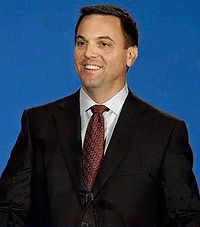
Tim Hudak, Leader 2009–2014

Results of the 2014 Ontario general election showing support for Progressive Conservative candidates by riding
John Tory announced his pending resignation as leader on March 6, 2009; the day following his defeat in a by-election for Haliburton—Kawartha Lakes—Brock. On June 27, 2009, party members elected Tim Hudak as the party's new leader. Christine Elliott, Frank Klees, and Randy Hillier were the unsuccessful candidates.
Hudak led the Tories through two elections. In the 2011 provincial election, the McGuinty Liberal government was reduced to a minority. Hudak's Tories were widely expected to win the 2014 provincial election but the Liberals, now led by Kathleen Wynne, were returned with a majority government largely due to Hudak's campaign pledge to cut 100,000 public service jobs by attrition rather than by layoffs. Hudak resigned in the aftermath. On July 2, 2014, Jim Wilson was chosen by the Progressive Conservative caucus to be its interim leader until the 2015 leadership election.[32]
The Ontario PC Party's 2014 platform promised the following policies:[33]
- Reduce personal income tax by 10 percent
- Reduce the corporate income tax rate from 11.5 percent to 8 percent
- Eliminate 100,000 public sector positions
- Deregulate businesses
- Balance the budget within two years
- Eliminate Local Health Integration Networks
- Harmonize the mental health system
- Allow more private delivery of health care services
- Eliminate the Healthy Homes Renovation tax credit
- Increase school class sizes by two to three students
- Scrap planned pay raises for elementary school teachers
- Introduce stantardized testing for science
- Reduce tuition grants
- Increase Go Transit services
- Scrap proposed Light Rail Train expansions
- Build the East-West Express subway in Toronto
- Freeze the Ontario child benefit at $1,200
- Eliminate wind and solar subsidies
- Expand nuclear, natural gas and hydroelectric power generation.
- Import electricity from outside of Ontario
- Declare a two-year pay freeze for public servants
- Merge Ontario's twenty-seven ministries into 16 ministries
Opposition under Patrick Brown (2015 to 2018)

Patrick Brown, Leader 2015–2018
On May 9, 2015, the membership elected Patrick Brown, a federal Conservative MP from Barrie, as the leader of the party. Christine Elliott was the unsuccessful candidate with Vic Fedeli, Lisa MacLeod, and Monte McNaughton withdrawing prior to the vote.
Since he did not hold a seat in the Legislature, the party requested that MPP Garfield Dunlop resign his seat in Simcoe North so that Brown could run. Brown was elected as MPP for Simcoe North in a by-election held September 3, 2015.[34]

Party logo (2016–2018)
At the party's 2016 Annual General Meeting (the first since the leadership election) Brown announced that the Progressive Conservatives would take on a more inclusive and compassionate tone, shifting to the political centre by reach out to groups that do not typically support the party including trade unions, and pursue "sensible" carbon pricing.[35] He also unveiled a new logo to represent the commitment to "inclusion, renewal, openness and change".[36] Brown stated his intention to change the party by moving away from past campaigns where one particular issue often cost them support, such as Tim Hudak's proposed public sector job cuts in the 2014 election or John Tory's proposal to extend public funding to all faith-based schools in 2007.[35]
Led by the Campaign Life Coalition,[37] a socially conservative anti-abortion organization that had supported Brown's leadership bid and disapproved of his move to the centre[38][39] a breakaway party called "Ontario Alliance" was formed to represent disaffected social conservatives.[40] Similarly, the Trillium Party of Ontario aimed to represent conservative libertarians who have been left out.[41][42] In particular, Brown expelled Carleton—Mississippi Mills MPP and former Ontario Land Association president Jack MacLaren out of the party after he made negative disparaging comments about Francophone language rights. MacLaren subsequently crossed the floor to become the Trillium Party's first member in the Ontario Legislature.[43] As well, some conservatives in Northern Ontario who have felt unrepresented by the Tories and alienated by the party leadership have joined the Northern Ontario Party.[44]
On January 24, 2018, Brown was accused by two women of engaging in sexual misconduct. Brown denied the allegations and initially refused to step down. After pressure from within the party caucus, including calls for his resignation by Deputy PC Leaders Sylvia Jones and Steve Clark,[45]
he resigned as leader in the early hours of January 25.[46][47][48][49][50]
Transition under Vic Fedeli (January to March 2018)

Vic Fedeli, interim leader following the resignation of Patrick Brown.
With Brown's resignation occurring less than five months before the next provincial election, the party executive met on January 25, 2018 to determine whether to have the next Progressive Conservative Party of Ontario leadership election before the provincial election, and if so how it will proceed, or whether to have the interim leader lead the party into the election.[51]Vic Fedeli, Nipissing MPP and former mayor of North Bay, was chosen as interim leader by caucus on January 26, 2018.[52] The Party held a leadership convention on March 10, 2018.
Fideli's first major task as interim leader was to investigate the allegations of questionable spending on lawsuits and unsubstantiated favours to allies during Brown's tenure.[53] Party president Rick Dykstra resigned on January 28, 2018.[54] He indicated that it was time for "someone else to lead us through the hard work". Shortly afterwards, Maclean's magazine revealed allegations of sexual assault against Dykstra, stemming from a 2014 incident when Dykstra was a federal MP.[55][56] Several other key party and campaign staffers were dismissed or their positions eliminated due to a "reorganization" in the days after Brown's resignation.[57]
Doug Ford leadership (March 2018 to present)

Doug Ford, Leader 2018 - Present

The percentage of votes cast for the Progressive Conservatives by riding.
On March 10, 2018, Doug Ford, former city councillor and the brother of the late former Mayor of Toronto Rob Ford, was elected as leader of the PC Party, narrowly defeating runner-up Christine Elliott on the third ballot with 50.6% of allocated points, although Elliot had more votes. Due to not having a seat in the legislature, Ford chose to have Vic Fedeli remain as Leader of the Opposition prior to the 2018 election.

Party Logo 2018 - Present
The Ontario PC Party's 2018 platform was named the Plan For The People. Policy promises included:[58]
- Lower electricity prices by 12%
- Repeal the Green Energy Act
- Remove the board and CEO of Hydro One
- Declare a moratorium on energy projects
- Expand GO train service
- Take over Toronto's subway system
- Restore passenger train service to Northern Ontario
- Hire a private auditor to audit spending
- Balance the budget
- Eliminate cap-and-trade
- Lower taxes on gasoline by 10 cents per litre
- Lower the second income tax bracket by 20%
- Eliminate income tax for minimum wage workers
- Challenge the federal carbon tax in court
- Lower the small business tax by 8.7%
- Lower the corporate tax from 11.5% to 10.5%
- Deregulate businesses
- Freeze the minimum wage at $14 per hour
- Eliminate subsidies for businesses
- Allow private stores to sell beer and wine
- Lower the minimum price of beer to $1
- Increase mental health funding
- Create 30,000 long-term care beds over 10 years
- Increase autism funding
- Fund dental care for low-income seniors
- Create a new math curriculum
- Create a new sexual education curriculum
- Require teachers to study math in teachers' college
- Require universities to have free speech policies
On June 7, 2018, Ford led the party to a majority government. The PC Party won 76 of 124 seats and 40.5% of the vote.
Party leaders
The party was known as the Liberal-Conservative Association of Ontario from 1867 to 1942, and then as the Progressive Conservative Party of Ontario from 1942 to present.
| Photo | Leader | Years in Office | |
|---|---|---|---|
| 1 | 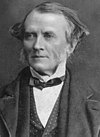 | John Sandfield Macdonald | 1867–1871 |
| 2 |  | Matthew Crooks Cameron | 1871–1878 |
| 3 |  | William Ralph Meredith | 1878–1894 |
| 4 | George Frederick Marter | 1894–1896 | |
| 5 | 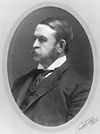 | Sir James P. Whitney | 1896–1914 |
| 6 |  | Sir William Hearst | 1914–1919 |
| 7 |  | George Howard Ferguson | 1919–1930 |
| 8 | 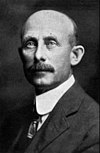 | George Stewart Henry | 1930–1936 |
| 9 | William Earl Rowe | 1936–1938 | |
| 10 | 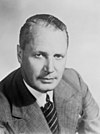 | George Drew | 1938–1942 |
| 11 |  | Thomas Kennedy | 1948–1949 (interim) |
| 12 | 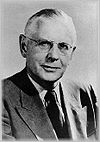 | Leslie Frost | 1949–1961 |
| 13 |  | John Robarts | 1961–1971 |
| 14 | 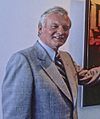 | Bill Davis | 1971–1985 |
| 15 | Frank Miller | 1985 | |
| 16 | Larry Grossman | 1985–1987 | |
| 17 | Andy Brandt | 1987–1990 (interim) | |
| 18 |  | Mike Harris | 1990–2002 |
| 19 | Ernie Eves | 2002–2004 | |
| 20 | 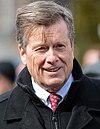 | John Tory | 2004–2009 |
| 21 | Bob Runciman | 2009 (interim) | |
| 22 | 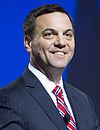 | Tim Hudak | 2009–2014 |
| 23 | Jim Wilson | 2014–2015 (interim) | |
| 24 |  | Patrick Brown | 2015–2018 |
| 25 | 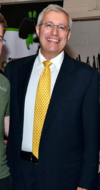 | Vic Fedeli | 2018 (interim) |
| 26 | 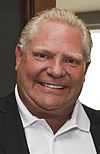 | Doug Ford | 2018–present |
Party presidents
| |||||||||||||||||||||||||||||||||||||||||||||||||||||||||||||||||||||||||||||||||||||||||||||||||||||||||||||||||||||||||||||||||||||||||||||||||||||||||||||||||||||||||||||||||||||||||||||||||||||||||||||||||||||||||||||||||||||||||||||||||||||||||||||||||||||||||||||||||||||||||||||||||||||||||||||||||||||||||||||||||||||||||||||||||||||||||||||||||||||||||||||||||||||||||||||||||||||||||||||||||||||||||||||||||
| Office | Name | Additional Responsibilities |
|---|---|---|
| President | Jag Badwal | |
| 1st Vice President | Marc Marzotto | Membership Chair |
| 2nd Vice-President | Siri Vallipuranathar | |
| 3rd Vice-President | Kaydee Richmond | Constitutionally the Policy Chair |
| 4th Vice-President | Lucca Bucci | Constitutional Chair |
| 5th Vice-President | Elanor Brodie | |
| 6th Vice-President | Zack Goldford | Organization Chair |
| 7th Vice-President | Andrew Brander | |
| 8th Vice-President | Gaggan Gill | |
| 9th Vice-President | Alanna Newman | |
| Regional Vice-President (Central East) | Heather Kenney | |
| Regional Vice-President (Central West) | Kevin Weatherbee | |
| Regional Vice-President (East) | Thomas Degroot | |
| Regional Vice-President (GTA East) | Aaron Hopkins | |
| Regional Vice-President (GTA West) | Tony Vella | |
| Regional Vice-President (North 1) | Derek Parks | |
| Regional Vice-President (North 2) | Diane Suski | |
| Regional Vice-President (South Central) | Jason Pollock | |
| Regional Vice-President (South West) | Matthew Rae | |
| Regional Vice-President (Toronto) | Justin Van Dette | |
| President, PC Women in Politics | Sandra Larmour | |
| President, Ontario PC Campus Association | Alexander Eyre | |
| President, Ontario PC Youth Association | Carl Qiu | |
| Secretary | Jim Kwan | |
| Treasurer | Abraham Elias |
Election results
| Election | Seats won | Change +/- | Popular vote | Popular vote (%) | Legislative role | Government | Party leader |
|---|---|---|---|---|---|---|---|
1867 | 41 / 82 | Coalition | Conservative-led coalition with support from moderate Liberals | John Sandfield Macdonald | |||
1871 | 38 / 82 | Official Opposition | Liberal majority | ||||
1875 | 34 / 88 | Matthew Crooks Cameron | |||||
1879 | 29 / 88 | William Ralph Meredith | |||||
1883 | 37 / 88 | ||||||
1886 | 32 / 90 | ||||||
1890 | 34 / 91 | ||||||
1894 | 23 / 94 | ||||||
1898 | 42 / 94 | James P. Whitney | |||||
1902 | 48 / 98 | ||||||
1905 | 69 / 98 | Majority Government | Conservative | ||||
1908 | 86 / 106 | ||||||
1911 | 82 / 106 | ||||||
1914 | 84 / 111 | 55.3% | |||||
1919 | 25 / 111 | 34.9% | Third Party | United Farmers of Ontario-Labour Coalition | William Howard Hearst | ||
1923 | 75 / 111 | 49.8% | Majority Government | Conservative | George Howard Ferguson | ||
1926 | 72 / 112 | 57.6% | |||||
1929 | 90 / 112 | 58.8% | |||||
1934 | 17 / 90 | 39.8% | Official Opposition | Liberal majority | George S. Henry | ||
1937 | 23 / 90 | 40% | William Earl Rowe | ||||
1943 | 38 / 90 | 35.7% | Minority Government | Progressive Conservative | George Drew | ||
1945 | 66 / 90 | 44.3% | Majority Government | ||||
1948 | 53 / 90 | 41.5% | |||||
1951 | 79 / 90 | 48.5% | Leslie Frost | ||||
1959 | 83 / 90 | 48.5% | |||||
1959 | 71 / 90 | 46.3% | |||||
1963 | 77 / 108 | 48.9% | John Robarts | ||||
1967 | 69 / 117 | 42.3% | |||||
1971 | 78 / 117 | 44.5% | Bill Davis | ||||
1975 | 51 / 125 | 36.1% | Minority Government | ||||
1977 | 58 / 125 | 39.7% | |||||
1981 | 70 / 125 | 44.4% | Majority Government | ||||
1985[64] | 52 / 125 | 1,343,044 | 37.0% | Initially minority government then Official Opposition | Progressive Conservative minority until no-confidence vote, followed by Liberal minority | Frank Miller | |
1987 | 16 / 130 | 931,473 | 24.7% | Third party | Liberal majority | Larry Grossman | |
1990 | 20 / 130 | 944,564 | 23.5% | New Democratic majority | Mike Harris | ||
1995 | 82 / 130 | 1,870,110 | 44.8% | Majority Government | Progressive Conservative | ||
1999 | 59 / 103 | 1,978,059 | 45.1% | ||||
2003 | 24 / 103 | 1,559,181 | 34.7% | Official Opposition | Liberal majority | Ernie Eves | |
2007 | 26 / 107 | 1,398,857 | 31.6% | John Tory | |||
2011 | 37 / 107 | 1,527,959 | 35.4% | Liberal minority | Tim Hudak | ||
2014 | 28 / 107 | 1,506,267 | 31.25% | Liberal majority | |||
2018 | 76 / 124 | 2,324,742 | 40.50% | Majority Government | Progressive Conservative majority | Doug Ford |
References and footnotes
^ Benzie, Robert (January 28, 2018). "Ontario PC president resigns after sexual assault allegations while Tories clean house". Toronto Star. Retrieved January 29, 2018.Jag Badwal, a party vice-president, will be the interim president.
.mw-parser-output cite.citation{font-style:inherit}.mw-parser-output q{quotes:"""""""'""'"}.mw-parser-output code.cs1-code{color:inherit;background:inherit;border:inherit;padding:inherit}.mw-parser-output .cs1-lock-free a{background:url("//upload.wikimedia.org/wikipedia/commons/thumb/6/65/Lock-green.svg/9px-Lock-green.svg.png")no-repeat;background-position:right .1em center}.mw-parser-output .cs1-lock-limited a,.mw-parser-output .cs1-lock-registration a{background:url("//upload.wikimedia.org/wikipedia/commons/thumb/d/d6/Lock-gray-alt-2.svg/9px-Lock-gray-alt-2.svg.png")no-repeat;background-position:right .1em center}.mw-parser-output .cs1-lock-subscription a{background:url("//upload.wikimedia.org/wikipedia/commons/thumb/a/aa/Lock-red-alt-2.svg/9px-Lock-red-alt-2.svg.png")no-repeat;background-position:right .1em center}.mw-parser-output .cs1-subscription,.mw-parser-output .cs1-registration{color:#555}.mw-parser-output .cs1-subscription span,.mw-parser-output .cs1-registration span{border-bottom:1px dotted;cursor:help}.mw-parser-output .cs1-hidden-error{display:none;font-size:100%}.mw-parser-output .cs1-visible-error{font-size:100%}.mw-parser-output .cs1-subscription,.mw-parser-output .cs1-registration,.mw-parser-output .cs1-format{font-size:95%}.mw-parser-output .cs1-kern-left,.mw-parser-output .cs1-kern-wl-left{padding-left:0.2em}.mw-parser-output .cs1-kern-right,.mw-parser-output .cs1-kern-wl-right{padding-right:0.2em}
^ "Interim Ontario PC leader says party has 67,000 fewer members than claimed". ctvnews.ca. 2 February 2018.
^ "What We Stand For".
^ "Partis politiques inscrits en Ontario" (in French). Elections Ontario. Retrieved 13 August 2015.
^ Thomas Walkom, "Veer to the right in Ontario PC leadership race risks party's election chances", "Toronto Star", Feb. 19, 2018
^ Taube, Michael. "Why the Ontario Progressive Conservatives aren't 'progressive'". thestar.com. The Star.
^ Coyne, Andrew (13 June 2014). "Andrew Coyne: The Ontario election was a referendum on fiscal conservatism. Fiscal conservatism lost". National Post. National Post.
^ Nanji, Sabrina. "Why Doug Ford's populist politics are resonating with Ontarians | The Star". thestar.com. Toronto Star.
^ "Here are all of Doug Ford's promises he made in Ontario election 2018". Macleans.ca. 7 June 2018.
^ "Ontario PC Leader Doug Ford vows middle class tax cut at cost of $2.3B". Global News.
^ "Ontario PC leadership rivals scrap carbon tax from platform". CBC.
^ Samantha Beattie, "PC Leader Doug Ford promises to scrap the Liberals sex-ed curriculum", "Toronto Star", Mar. 12, 2018
^ "Patrick Brown admits courting social conservatives was a 'mistake' | The Star". Toronto Star.
^ "Ontario Announces Cannabis Retail Model". news.ontario.ca. Government of Ontario.
^ "Change your stance on overdose prevention sites, health groups urge Ford | CBC News". CBC.
^ Kassam, Ashifa (30 April 2018). "Canada's Trump moment? Doug Ford rises in conservative party". The Guardian.
^ Jeffords, Shawn. "Doug Ford's plan to fire Hydro One CEO would cost at least $10.7M". Global News.
^ "Constitution Progressive Conservative Party of Ontario" (PDF).
^ "Ontario PC". ontariopc.com.
^ "Ontario PC". ontariopc.com.
^ "McGuinty wins massive majority, Tory loses seat". cbc.ca. 11 October 2007.
^ ab "Will provincial leaders stay, or go?" — Toronto Star/TheStar.com (October 15, 2007)
^ "GrassrootsPC.ca". grassrootspc.ca. Archived from the original on 2008-05-11.
^ "Decision won't sit well with Tory's detractors" — London Free Press (February 24, 2008)
^ ab "Tory to remain leader of Ontario PCs despite lukewarm vote". The Globe and Mail. February 23, 2008. Retrieved December 1, 2015.
^ ab "Controversy dogs Ontario PC leadership review". The Globe and Mail. February 23, 2008. Retrieved December 1, 2015.
^ "Ontario's Tory hopes party will forgive and forget". The Globe and Mail. February 22, 2008. Retrieved December 1, 2015.
^ "Tory to remain as PC leader". thestar.com. 24 February 2008.
^ "'Time to move on' after divisive leadership vote: Conservative Leader John Tory" — Canadian Press (February 24, 2008)[dead link]
^ ab "Conservative Leader John Tory to remain after 67 per cent in leadership vote" — Canadian Press (February 23, 2008)[dead link]
^ ab "Critics assail 'weak' Tory"[permanent dead link] — National Post (February 24, 2008)
^ "Progressive Conservatives pick Jim Wilson as interim leader". Toronto Star. July 2, 2014. Retrieved July 2, 2014.
^ "Compare party platforms".
^ Elections Ontario (2015). "Official Returns from the Records, 086 Simcoe North" (PDF). Retrieved 17 November 2015.
^ ab Ferguson, Rob (March 5, 2016). "Patrick Brown sees a new, inclusive Ontario PC party". Toronto Star. Retrieved March 7, 2016.
^ Ferguson, Rob (March 5, 2016). "Ontario's PC Party unveils a new logo". Toronto Star. Retrieved March 7, 2016.
^ [1]
^ [2]
^ "Archived copy". Archived from the original on 2017-08-01. Retrieved 2018-08-31.CS1 maint: Archived copy as title (link)
^ [3]
^ [4]
^ [5]
^ [6]
^ [7]
^ https://www.thestar.com/news/queenspark/2018/01/24/tory-leader-patrick-brown-denies-allegations-of-misconduct.html?source=newsletter
^ https://www.theglobeandmail.com/news/politics/ontario-tories-have-little-time-to-make-sense-of-what-patrick-brown-left-behind/article37728032/
^ "Ontario PC Leader Patrick Brown denies sexual misconduct allegations". CBC News. January 24, 2018. Retrieved January 24, 2018.
^ Aiello, Rachel; McGregor, Glen (January 24, 2018). "Patrick Brown denies sexual misconduct allegations from two women". CTV News. Retrieved January 25, 2018.
^ "Statement from Ontario PC Leader Patrick Brown". Progressive Conservative Party of Ontario. Retrieved January 25, 2018.
^ "Patrick Brown resigns as Ontario PC leader after sexual misconduct allegations". CBC News. January 25, 2018.
^ https://www.thestar.com/news/queenspark/2018/01/25/tories-looking-for-new-leader-after-patrick-brown-sex-scandal.html
^ "Vic Fedeli chosen as interim leader of Ontario PCs with election looming". CBC News. January 26, 2018. Retrieved January 26, 2018.
^ https://www.ctvnews.ca/canada/ontario-pc-party-plans-to-hold-leadership-race-before-spring-election-1.3776857
^ Rizza, Alanna (January 28, 2018). "Ontario PC party president Rick Dykstra resigns". Toronto Star. Retrieved January 28, 2018.
^ Maher, Stephen (January 28, 2018). "Ontario PC Party president Rick Dykstra resigns after sexual assault accusation". Maclean's. Retrieved January 29, 2018.
^ Platt, Brian (January 30, 2018). "What the heck is happening in the race to replace Patrick Brown as Ontario PC leader? Here's what we know". National Post. Retrieved August 15, 2018.
^ "President of Ontario PC party Rick Dykstra resigns hours after alleged sexual assault surfaces". National Post. The Canadian Press. January 29, 2018. Retrieved January 29, 2018.
^ "Plan For The People".
^ "Ottawa Citizen - Google News Archive Search". google.com.
^ abcd NinerNet Communications. "The Decline of Party Revisited « British Columbia Political Studies Association". bcpsa.ca.
^ "Legislative Assembly of Ontario - Debates & Proceedings - House Documents - Official Records for 16 October 1984". ontla.on.ca.
^ "CBC Archives". cbc.ca. 10 April 2013.
^ https://www.ontariopc.ca/party_executive pull July 20, 2018
^ Won most seats in 1985 election, but lost power after Liberals signed a pact with the NDP to form the government.
See also
- Official Opposition Shadow Cabinet of the 40th Legislative Assembly of Ontario
- List of Ontario general elections
- List of Premiers of Ontario
- List of Leaders of the Opposition in Ontario
- List of political parties in Canada
- List of political parties in Ontario
- Ontario PC Youth Association
- Ontario PC Campus Association
External links
- Official website

